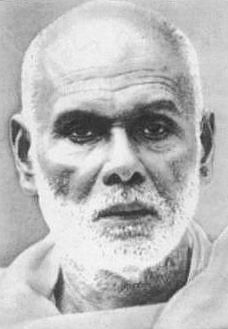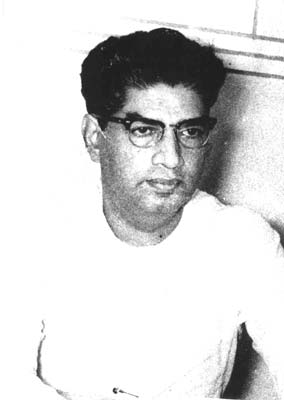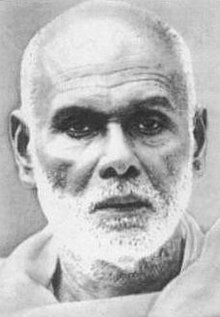
Narayana Guru was a philosopher, spiritual leader and social reformer in India. He led a reform movement against the injustice in the caste-ridden society of Kerala in order to promote spiritual enlightenment and social equality. A quote of his that has become popular: "one caste, one religion, and one god for all men". He is the author of the Advaita poem Daiva Dasakam, which is one of the most used poem in Kerala for community prayer.

Mahakavi Kumaran Asan was a poet of Malayalam literature, Indian social reformer and a philosopher.He is known to have initiated a revolution in Malayalam poetry during the first quarter of the 20th century, transforming it from the metaphysical to the lyrical and his poetry is characterised by its moral and spiritual content, poetic concentration and dramatic contextualisation. He is one of the triumvirate poets of Kerala and a disciple of Sree Narayana Guru. He was awarded the prefix "Mahakavi" in 1922 by the Madras university which means "great poet".
Secular National Dravida Party, was a political party in the Indian state of Kerala. The party was founded on 7 January 2004 by elements of the Ezhava caste organization Ezhava Mahajana Sabha. Founding chairman was S. Suvarnakumar. The party professed itself to 'Sreenarayanism', the teachings of Shree Narayana Guru. The party also demanded higher representation for the Ezhava caste in the political process.
Nataraja Guru was a disciple of Narayana Guru. Nataraja Guru founded Narayana Gurukula on 1923 for the integral study of various wisdom approaches.

Raman Sankar was an Indian politician, statesman, administrator,orator, educationist, writer and editor who served as the 3rd Chief Minister of Kerala from 1962 to 1964.

The Nair Service Society (NSS) is an organisation created for the social advancement and welfare of the Nair community that is found primarily in the state of Kerala in Southern part of India. It was established under the leadership of Mannathu Padmanaban. The NSS is a three-tier organisation with Karayogams at the base level, Taluk Unions at the intermediate level and a central headquarters operating from Perunna, Changanassery in Kerala. G. Sukumaran Nair is the present General Secretary.

C. Kesavan was a politician,freedom fighter,social reformer, statesman and the chief minister of Travancore-Cochin during 1950–1952. He led the Nivarthana agitation in Travancore to gain the democratic authority for the citizens to decide on the legislation and to attain opportunities regardless of caste or social and economical status.
Kumbalathuparambu Ayyappan, better identified as Sahodaran Ayyappan, was a social reformer, thinker, rationalist, journalist, and politician from Kerala, India. As a vocal follower of Sree Narayana Guru, he was associated with a number of events related to the Kerala reformation movement and was the organizer of Misra Bhojanam in Cherai in 1917. He founded Sahodara Sangam, and the journal Sahodaran and was the founder editor of the magazine Yukthivadi.

Padmanabhan Palpu was a physician from the Kingdom of Travancore who served as a chief medical officer of Mysore State.

The Ezhavas are a community with origins in the region of India presently known as Kerala, where in the 2010s they constituted about 23% of the population and were reported to be the largest Hindu community. The Malabar Ezhava group have claimed a higher ranking in the Hindu caste system than do the others, although from the perspective of the colonial and subsequent administrations they were treated as being of similar rank.

Mooloor S. Padmanābha Panicker (1869-1931) was a poet and a prominent social reform activist from the Travancore region of present-day Kerala.

T. K. MadhavanAlias Dehabhimani Madhavan, was an Indian social reformer, journalist and revolutionary, who was involved with the Sree Narayana Dharma Paripalana Yogam. He hailed from Kerala and led the struggle against Social discrimination which was known as Vaikom Satyagraha.

Advaita Ashram - the ashrams in Aluva, founded in 1913 Sree Narayana Guru. Here he also established a Sanskrit school to restore the sanctity of the language through which universal spiritual teachings can be grasped and imparted to dedicated disciples.

C. V. Kunhiraman was an Indian social reformer, journalist and the founder of Kerala Kaumudi daily. A follower of Sree Narayana Guru, Kunhiraman was the author of a number of books covering the genres of novels, short story, poetry, biographies and essays. He was one of the leaders involved in the Vaikom Satyagraha of Reformation movement in Kerala which led to the Temple Entry Proclamation.
Changaramkumarath Krishnan Vakkeel was a community leader, banker, social reformer, and journalist from Kerala, India. He was a champion of implementing the revolutionary socialist reforms proposed by Sree Narayana Guru for the upliftment of the downtrodden people of Kerala. He was called Mithavathi―a minimalist―after the newspaper he published from 1913 to 1938 to spread the message of the reformist movement. He was well-educated and hailed from an influential family. Although he could have entered the government service and risen to higher positions with his education and wealth, he renounced all these for the liberation of the backward classes from the clutch of pathological social system.
Events in the year 1903 in India.
Mannanthala Anandavalleshwaram Devi Temple is a Hindu temple in the Mannanthala suburb of Thiruvananthapuram, India.
The SAS SNDP Yogam College is the first college in Konni, Kerala, India. It was started by the Sree Narayana Dharma Paripalana Yogam (SNDP), in 1995. Resolved to establish a college at Konni in Memorial obeisance to the great philosopher and social reformer, Sahodaran Ayyappan, an ardent disciple of Sree Narayana Guru to provide better, higher educational facilities mainly for the backward classes of the region.
Ezhava is a caste in Kerala. Shiva is a Hindu god. Siva idol was consecrated by social reformer Sree Narayana Guru at Aruvippuram, in 1888. Ezhava Siva refers not to Siva as God but to the tongue-in-cheek reply given by Sree Narayana Guru when questioned by a group of Brahmins about the legitimacy of a non Brahmin consecrating a temple. This was a major break from tradition as installation of idols by non Brahmins was considered blasphemy and Sree Narayana Guru belonged to the lower caste Ezhava community. The sarcasm was meant to highlight the immorality of Brahmins who denied social spaces and the right to worship from the lower castes.











